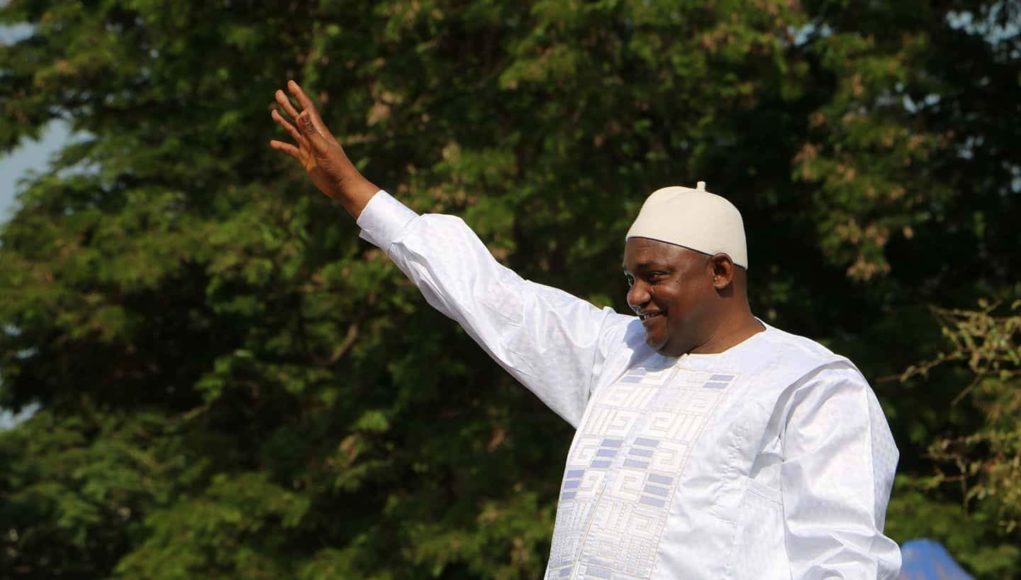By Foday Samateh
This should be the high noon of reform. An unwavering, single-minded moment of transition to the third republic. But rather than rethinking government — its set-up, its operations and its proper roles — in a new paradigm that is pragmatic and optimal, the powers be in Banjul are stuck in the mindset of the corrupting, bankrupt status quo.
It’s sad that two years in office, Adama Barrow still presides over the same system of his predecessor whom he rightly condemns as corrupt and autocratic. It’s sadder to see uncanny resemblances in the two men’s attitudes and approaches to the business of governing. It’s saddest to hear him bragging that he commanded more police power than the dictator ever had at his disposal.
Of course, Barrow isn’t abducting people to be tortured or disappeared by the secret police; nor is he proving a point to have his critics languish in prison with or without sham trials. And yes, citizens no longer have to glance over their shoulders when they speak their minds about their country. But with no intention of downplaying the significance of these positive developments, it’s worth underscoring that they should be taken for granted. They happened not because of Barrow, but in spite of him being the President. These freedoms are bound to occur under almost anyone who succeeded Yahya Jammeh. What’s more, we owe Barrow not a jut of gratitude for these freedoms. They are the least any President owes the country.
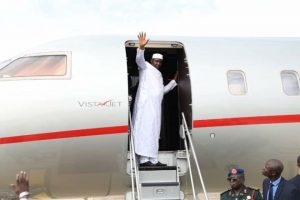
The similarities between Adama Barrow and Yahya Jammeh that cannot be overlooked include their youth movements, their foundations, their wives’ foundations, their embrace of patronage, their craven propensity for bestowing “personal gifts,” their itchy palms to accept secret “donations” from anonymous “philanthropists,” their venal use of the influence of their office to build their hometowns, their sanctimonious displays of their religious piety, their knack to hop on planes to foreign capitals, their strident rhetorics attacking critics, their tendencies for self-adulations, their arrogant air of being at the helm, their penchant for summarily firing cabinet officials as an assertive exercise of presidential power, their insufferable obsession with consolidating power as the driving force of their presidencies. What a disheartening long list.
No one with any sense of fairness or realistic expectation thought that Barrow inherited an easy job. The inevitable nightmare of every despot’s successor is the dysfunctional system they have to own as their responsibility. The challenge is to reorient power from being concentrated in a strong man to strong institutions organized on the principle of checks and balances. There is no perfect formula for this. All governing is an experiment. There will be false starts and stumbles along the way. But a leader who is determined to do the right thing and only the right thing for the people will always eventually get the job done. That was the promise of Barrow.
But that promise is betrayed more and more by his words and actions. The fact that his performance in office draws comparisons to the discredited record and style of a disgraced fraud is a clear indictment of presidency.
Following his election, there was one defining question amid the initial euphoria and the ensuing anxiety of an “impasse.” What kind of president would Barrow be? A generational divide had already formed on what path to take. Some pined for the past. A return to the Mansa days of Jawara’s rule when times were simpler; values were steeped in tradition and culture; and the leader stood on a pedestal to be admired and revered, and their authority had the force of majesty and mystique. Others looked forward to the future. A march of triumph into the third republic to lay claim to great expectations. A new era of freedom and democracy with the government as a means to provide security and opportunities for people to pursue their dreams.
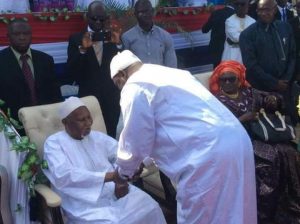
Both sides — nostalgics and dreamers — projected their perspective of things on the President-elect with some justifications. It wasn’t hard to see, however, where Barrow’s true loyalties lay. The chaotic transition of fifty days offered unmistakable indications. He had a flurry of daily interactions with all sorts of people at Kairaba Beach Hotel. It was quite commendable that he gave audience to delegations not just from foreign nations, but also hardworking, honest folks from villages and hamlets across the country.
The excitement that characterized these meetings with the good, humble citizens was infectious all round. The people who came to acquaint themselves with their soon-to-be leader had never felt more excited. Barrow, too, had never felt more excited in his overnight rise to the stratosphere of national achievement and international fame than when he was speaking to these rolling crowds of well-wishers. These interactions, happening in a country that had been for over twenty years traumatized by fear of a terrible tyrant, had the effect of cinematic, magical feel. Joy was in the air oxygenated with optimism.
The intoxicating and therapeutic effects of the jubilant mood, though natural and needed for the occasion, obscured something that would have far more lasting consequence for the nation — Barrow’s beliefs.
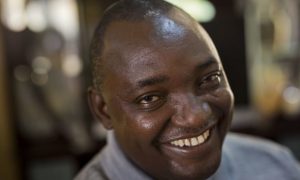
Up to this point, Barrow had been a political unknown. Very few people in the United Democratic Party (UDP), where he ended up as Acting Treasurer, even knew who he was, much less the rest of the nation. His prepared statement seeking the party’s presidential nomination, besides bare-bones biographical facts, was empty of any meaningful information. Nothing in there was remotely suggestive of his beliefs as potential leader of the nation. The announcement of his winning that contest had been greeted around the country and beyond with one universal question: “Who is Adama Barrow?”
The leading opposition party winding up with a little-known presidential candidate attested to a lack of real competition in the bid. This fact further spoke to the dismal state the party had found itself in as well as the precarious political reality in the country in the run-up to the December 2016 election. As the year commenced, the opposition parties began making demands for electoral reforms. All the opposition parties would benefit from an open democratic space and a level playing field. But UDP stood to gain the most. In addition to being poised to be the most likely to pull off an unlikely upset, it faced one major hurdle. The Party Leader and Secretary General, and four-time presidential candidate, Ousainou Darboe, was over the constitutional age limit of 65 years. The demands for reform, to no one’s surprise, fell on the deaf ears of the dictator in the State House who loved to be called His Excellency President of the Republic of The Gambia Sheikh Professor Alhaji Dr. Yahya A J. J. Jammeh Nasirudeen [Defender of Islam] Babili Mansa [the King who build bridges]. He had no incentives to accommodate any of the oppositions’ reform demands for two reasons. First: the more disadvantages they confronted, the easier his cruise to his fifth victory would be. And second: he loathed democracy as an encumbrance on his power. As he saw it, his refusal to budge was a punishment he was inflicting on the opposition and democracy — two of his many detested enemies — for his own pleasure. And as if he needed to make assurance double sure, he warned that anyone who took any action in violation of law and order would never live to see the election.
This ominous threat notwithstanding, a small group of UDP youth activists led by Solo Sandeng, the lion heart, conducted a peaceful demonstration at the Westfield Junction for electoral reforms. The Police Intervention Unit (PIU) swooped on them and whisked them away for organizing a public procession without a warrant, which, everyone knew, the police would never issue them under any circumstances. The PIU handed Solo and the other demonstrators over to the notorious National Intelligence Agency (NIA) for detention and questioning. By the early hours of the morning, media outlets broke the news of Solo’s murder and the bestial tortures of the rest, including women. Yahya Jammeh had kept his promise that some people would never live to see the election.
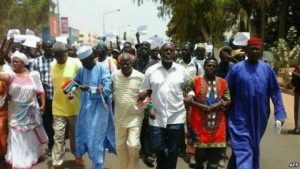
Everyone looked to the UDP leader, asking what would he do in response to this unconscionable crime against those who risked their lives for him, his party, and the country. In the past, Ousainou Darboe, affectionally called Lawyer Darboe, counseled strict adherence to the letter of the law in opposing the dictator despite endless harassments, attacks, arrests, and imprisonments his party members suffered. So, many resigned themselves to a déjà vu — a veteran lawyer counseling to seek redress of the volatile situation within the safe confines of the Constitution and the criminal code. Before the public realized what was happening, however, Darboe was out in the street leading his own peaceful, warrantless protest for the release of the demonstrators dead or alive. He had earlier summoned the party’s top executive to his house for an emergency meeting. The consensus was the normal rules of legal battle didn’t apply in this unprecedented case. In a pep rally before the march, Darboe threw all caution to the wind. If Solo and the others had been willing to give their lives for the country, he asserted, no less sacrifice was required of him and his fellow older generation of the party. He called out the dictator, daring him to shoot them in public in exercising their right to protest for the freedom of the demonstrators held in detention. As Darboe and his top executive marched down on Kairaba Avenue to the Westfield Junction, the PIU (the paramilitary wing of the police) swooped on them, too.
Meanwhile, the dictator rewarded his murderous torturers with a bull for a feast. Lawyer Darboe and his top executive were denied bail and remanded at Mile Two Prison. Their trial for protesting without a warrant and other trumped-up charges went as one would expect of any political trial. They stood not an iota of a chance in a kangaroo court that accorded them neither the presumption of innocence nor the constitutional right to a fair hearing. Hence, there was no suspense about the ruling. Their convictions were foregone conclusions.
By the time the mercenary judge of the trial handed down harsh prison sentences something changed in the country. The courage of Solo and Darboe and their brave followers to defy the dictator so publicly regardless of the grave risks to their own freedoms and lives awakened a consciousness of moral courage in people who never thought they had it in them. On every day of the proceedings, UDP supporters comprising youths, old men and old women from across the country gathered outside the prison and the courthouse, and thronged the highway to cheer Darboe and his top executive. These swelling multitudes of supporters, though of one ultimate mind, diverged along generational differences in mettle. On the one hand, the youths tended to be angry. When they were not spoiling for a confrontation with the PIU for preventing them from engaging in civil disobedience, they were piping profanities at the dictator. In Banjul, no less. The older supporters channeled their emotions in more restrained ways. The traditional singing and dancing the old women led, for instance, lifted spirits that were heavy with uncertainty about the repercussions of impending events. Either way, these gatherings were posing growing threats to the dictator’s rule in ways he had never anticipated. The fever of fear that had infected the nation into total submission to him was breaking. This, more than anything else, worried him about the show trial dragging on. Therefore, as quick as the sham was, it couldn’t end quickly enough for him. With Darboe and the UDP top executive locked behind bars, the supporters stayed home and all things returned to business as usual. The way Yahya Jammeh liked things to always be under his rule. But little did he suspect that he was no longer as feared as he had been the day before the arrest and murder of Solo Sandeng.
When the election finally approached, the political uncertainty since the trial of Lawyer Darboe only worsened. Especially, for UDP. Who would be their flag bearer? Would they formed or joined a coalition? Would they even participate in or boycott the election? With the party’s top leadership incarcerated in the dictator’s gulag, and no one of name in the country coming out to take their place, these questions weren’t perfunctory at the time. The campaign season kicking into full gear and other parties making moves, UDP issued a communique outlining its internal deliberations. The statement identified the party’s electoral prospects into three: going it alone, fronting a party-led coalition, or joining a coalition led by an independent candidate. There were still others in the party who strongly believed that participating in the election in any form was a waste of time and a gift of legitimacy to the dictatorship. The only solution for them was an Arab-spring-style uprising to rid the country of the dictator. In the end, the party decided to tentatively nominate its candidate for president while it reached out to the other oppositions for a possible coalition or alliance. These were the conditions under which Adama Barrow became the UDP nominee.
The next big thing was forming a coalition. UDP’s role was, for the most part, more leap of faith than proactive participation in the process. Well before the party came out with its communique to explore the prospects of leading or joining a coalition, Halifa Sallah, the Secretary General of People’s Democratic Organization for Independence and Socialism (PDOIS), was hosting multiparty talks on that very subject at Kairaba Beach Hotel. UDP sent a representative to the talks not as a participant but an observer. The final outlook of Sallah’s plan for an opposition coalition was apparent from the start. All the opposition parties would send 10 delegates from each of the seven administrative regions to a convention to nominate a candidate through a primary. The winner would resign from their party to lead the united opposition as an independent and served a truncated term of three years as president. Sallah had set out a version of this in the ill-fated NADD Memorandum of Understanding (MoU) among the opposition in 2006, and pushed for more or less the same in the failed attempts to build a coalition in 2011.
The lingering, acrimonious fallouts of the previous failures might explain UDP’s reluctance to take part in Sallah’s plan early on. But the party’s own eventual plan to negotiate a coalition that they could lead or join got zero traction. A stillborn. And the fast-changing situation on the ground was making decisions for them. Mama Kandeh, a former National Assembly member for the dictator’s ruling party and the founding leader of the new Gambia Democratic Congress (GDC), was attracting large crowds on his maiden tour as a presidential contender. Kandeh who also sent a representative to the talks at Kairaba Beach Hotel had made it clear in no uncertain terms that he would only join a coalition if he would lead it. As it turned out, he had bested Barrow in their home constituency of Jimara in his successful run for the National Assembly. In addition to Kandeh, UDP faced a fresh problem in Dr. Isatou Touray. The veteran women’s rights campaigner, whose credentials had been burnished by being jailed by the dictator, reached for the one remaining viable option. In a well-publicized press conference from a hotel ballroom, she announced her plans to run for president as an independent candidate, and called on all the opposition parties to rally behind her as the consensus choice who had the best chance to rid the country of the dictator. She brought to bear her long experience as a public speaker and her unfailing self-assurance to create nosies that would make a roaring lion blush.
Barrow launched his own test-the-water countrywide tour as the UDP nominee and drew even bigger crowds. It didn’t take a genius to divine that the country was starving for change. The people had had enough of the dictator. This was the boost of morale the party needed at their lowest of many low points in twenty years of existence. But it wasn’t enough to get them out of their conundrum, not by a long short. The party couldn’t afford to go it alone. That would be splitting the anti-incumbent vote to the dictator’s favor as it had been the case in the past. But to the embarrassment of the biggest opposition party in the country, they weren’t in charge of any realistic negotiation of a coalition. If UDP’s blessing were their enviable support base, their curse had always been their ineptitude to strike a compromise with negotiating partners around their own competitive advantage. And this time, they were feeling an added pressure to beat the dictator. As much as they wanted democracy restored in the country, they wanted Darboe and the party’s top executive released from prison. The only sure way to achieve either was to win the election. And the only sure way of winning the election was to be part of a coalition. Since they couldn’t get their own, their only choice was to go along with what was available. And so they swallowed their pride and begrudgingly joined the only active effort being negotiated: the Halifa Sallah plan.
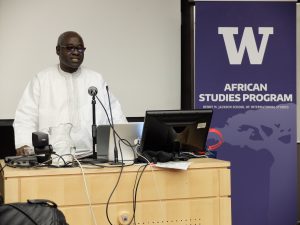
Once the terms of what became known as the Gentlemen’s Agreement were finalized and signed by seven opposition parties and an independent candidate, Barrow stood as UDP’s candidate for the coalition’s primary nomination. The speech he delivered at the nominating convention was, like his statement for his party’s nomination, simply uninteresting. Other than ear-pleasing generic promises, it was devoid of specifics about Barrow’s beliefs. And despite the equal number of delegates allocated to each party, he still astonished everyone when he pulled off an overwhelming victory on the first ballot against several prominent contenders. His first act as the coalition’s presidential candidate was a masterstroke. He tapped Halifa Sallah, the mastermind of the coalition, a contender for the nomination, a household name in politics and an intellectual powerhouse, as the spokesman. His reaching across the party divide to so well-regarded a figure for so crucial a position was read as Barrow rising above partisan interest for the national interest. It christened him a uniter and thus coalesced the support base of the opposition coalition behind him. The voter apathy that had dogged the opposition in previous elections gave way to widespread enthusiasm. The calculus and the psychology of the election changed. Though the delegate allocation for the convention had been grossly unfair to UDP given their incomparable size among the electorate, the rationale for the coalition was vindicated. And if any credit was deserved, the greatest share belonged to one man — Halifa Sallah.
Barrow’s third, and most climactic, contest of the election season brought him the ultimate denouement. Even so, there wasn’t any core principle or central policy to his run for the highest office in the land. But there was little compelling reason for him to provide one. Yahya Jammeh was too busy being Yahya Jammeh — huffing and puffing, lashing out, spewing insults and threatening extermination of a major tribe — a raging loose canon one day and a human Icelandic volcano the next. This venting of fear to intimidate his perceived enemies revealed his own deep-seated fear. The dictator, never in short supply of hubris, had been at his most bullish about the election. Of all the five he contested, it was supposed to be his easiest win. Hence the superabundance of confidence bred complacency at the beginning. But the realization that the country had soured on him came in the form of a rude awakening too late. To turn from invincible to vulnerable triggered in him unabated bouts of delirium. His doom and gloom screaming cost him further support.
Barrow was the contrast. Nothing was reprehensible or repulsive about him. His affable demeanor was disarming, and his innocuous words were calming. With no record to run on, he did what anyone in his position would do. He availed himself of promises that were there to be made. Namely, he would be a different president and the government would be run differently once he was in office. Perhaps the sincerest thing Barrow said on the trail was his oft-repeated admission that he was a political novice. An incredible thing for a politician. But he never failed to add that he would surround himself with people with vast knowledge in affairs of government, especially his coalition partners. If these two juxtaposing statements lent credence to both his campaign and character as a man unburdened with ego, they should have been viewed in their blight implications, too. But who had the time or the patience for such observations?
Large swathes of the country wanted anybody but Yahya Jammeh. The third candidate, Mama Kandeh, was also mounting an impressive campaign as another newbie on the presidential stump. But he had little realistic chance. If anything, he was drawing support from the despised and flailing dictator. The only game in town was Barrow, who and his boosters, mostly from UDP, promoted him as not just a successful real estate investor, but a trustworthy man known only for square deals. Other opposition party supporters who might have otherwise been skeptical of such hagiographic testimonials hung their hopes on Halifa Sallah, who was a constant presence around the candidate on the campaign trail as a credible advisor and confidant and coalition spokesman, and other big names in the opposition barnstorming various parts of the country as Barrow’s surrogates attesting to his bona fides.
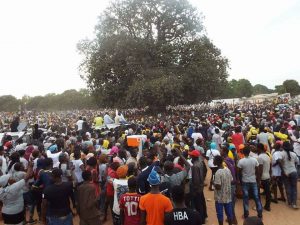
As for the rest of democracy activists, most of whom resided in the West which they fancied as the Diaspora to bestow special significance to their cause as a sacred struggle against a pharaoh-type oppressor, had no recourse to backing Barrow. This election might be the only chance to evict the dictator from the State House peacefully. The last push for the victory that, they believed, had been coming for twenty years. In addition, activists of an ideal tend to have so much faith in their own ability to bend reality to their dreams. The movement advocates in this case convinced themselves that though Barrow might not be their chosen candidate they needed him to prevail if only as a transitional figurehead to prepare the stage for their preferred leader for the new Gambia. The nostalgics for the old Gambia saw the same man and perceived in him the embodiment of the pre-dictatorship days they yearned to have back. Each of these disparate factions of the coalition listening to Barrow could swear they heard what they wanted to hear.
Who could blame them? Those who are too desperate to escape tyranny would gravitate toward anyone credibly posing to lead them on an exodus to freedom. They could afford neither the luxury nor the time to make distinctions between pledges and platitudes. And Barrow did offer a plenitude of the latter. He had a special talent for saying a lot without saying much. But the most remarkable, if not reassuring, part of him on the hustings was he made no gaffes or fool of himself. The news of his campaign was he made no news; not in the way politicians all over the world are prone to putting their foot in their mouths. This was no mean feat for an untested national candidate. His tone, the tenor of his message, and his temperament betrayed no trace of anger or grievance. His comportment throughout was congenially placid.
The election result came as an astonishing shocker! Within a nano-second, The Gambia became the most famous country under the sun. In the prior two decades, the country had been in the news for all the wrong reasons, thanks to the dictator’s antics, absurdities and cruelties. For example, his claim to have found a cure for HIV/AIDS, his nationwide witch hunting to avenge those he blamed for the death of his aunt through witchcraft, his constant crackdowns on the media and his political enemies, and his cynical fatwa against his imaginary menace of gays. This time, however, the country landed international headlines for the most enviable of reasons. The bigger shocker still was the dictator’s televised concession call to the winner. It was more gobsmacking than even the outcome of the election. Yahya Jammeh conceding the election, characterizing it as the freest and fairest in the history of elections, and attributing his loss to the will of Allah and The Gambian people was so out of character that it met the standard for a modern miracle. The scene itself depicted an image that was searing and indelible. The winner’s disembodied expression of humbleness was mere conversational filler for the dictator’s on-the-camera humbling. Magnanimity had never been made less interesting and easily forgotten by so complete and vivid a humiliation. The repudiation was the country’s revenge for two decades’ worth of repression.
But in an ironic sense, the unconditional acceptance of the election result had the effect of humanizing Yahya Jammeh from the cold-hearted wielder of power to what Claudio in Measure for Measure dubbed “this sensible warm motion.” Many a hardened hearts against him began softening. There was something else about the phone call that, in hindsight, should have been appreciated in full rather than ignored or dismissed at the time. He appeared center stage — alone — on television as the sole focus of attention, while Barrow was off-stage and invisible. The loser could have dispatched a camera crew to the winner for both to share the limelight via split-screens, but he didn’t. And as brief as the phone call was, he dominated the interaction. He was, even in defeat, the man in charge, the alpha male who dictated the terms of engagement and left the lasting impression. Hardly anyone could remember anything of substance Barrow said.
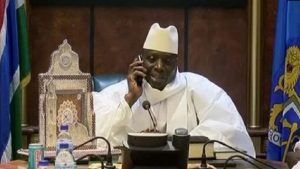
No student of the Bard who witnessed this dramatic spectacle would ever forgive themselves for missing the telling symbolisms of this very Shakespearean moment. In Shakespeare, such scenes are the natural resolution of the tragedies. The defeat (usually the death) of the protagonist (the villain or the hero), is always far more compelling than the victory or survival of the character who takes over in the final scene. In the history play Richard III, for instance, the audience is too much consumed with the defeat (and death) of Richard to pay any attention to Richmond (the victor) in the final speech of the final scene. When Antony and Cleopatra take their own lives in the play named after them, their nemesis Octavius is left to sing their praise as the world’s celebrity power couple. Macbeth’s loss of power (and death at the hands of Macduff) deprives Malcolm’s gain of power any real interest. The deaths of Lear and his angelic third daughter Cordelia are too disheartening for Edgar to succeed in lifting anyone’s spirits. Othello’s jealousy-crazed murder of Desdemona and his suicide are so grim for anyone to spare thoughts for Cassio’s succession as the general of the Venetian army. And Hamlet’s death by a poisoned sword in a fencing match reduces Fortinbras to only a necessary stand-in for the restoration of order. In each of these and the other tragedies, the future is just a measure of time. It holds no dramatic or thematic value of its own. And even as the new leading character wishes to forge ahead, he cannot make a clean break from what just transpired. The characters, the plots and the actions responsible for the tragedy still preoccupy and haunt the memory of the living — victors and survivors alike. These driving elements of human stories imprint so much effect on the mind and affect on the heart to let go.
This fact is the manifest legacy of Yahya Jammeh’s dictatorship. It’s also the manifest burden of Adama Barrow’s presidency.
But before any of it became all too obvious, the dictator’s surprising show of grace in defeat proved unsurprisingly fleeting. He would make one last gamble in the hopes of clinging on to power.

